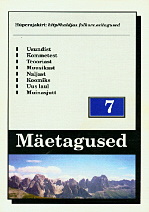Kultuuriidentiteet, rahvuslus ja muutused laulutraditsioonis
Cultural identity, nationalism and changes in singing traditions
Author(s): Kristin KuutmaSubject(s): Customs / Folklore
Published by: Eesti Kirjandusmuuseum
Summary/Abstract: The article describes some alterations in singing traditions from the aspect of sociocultural context and viewed from the Estonian perspective, providing a historical and social background of singing traditions, including the survey of the `national awakening' process. As particular occasions where singing traditions in relation to cultural identity are studied, two types of festivals have been chosen: a large national festival and a small community festival. The festivals studied occurred in the summer of 1994. The National Song Festival was arranged for the twenty-second time, that year exceptionally in two towns, Tartu and Tallinn. The community event was the Setu Kingdom Day, celebrated in Obinitsa village. Festival is observed here as cultural performance, characterized by periodicity and recurrence, by impersonal and predictable movement of time. A festival provides an opportunity to study the external orientation of customs, folkloristic phenomena, transformations in the sociocultural context, organized performance and the functional context of singing. In the contemporary society the use of the song as a tool in life-shaping experiences has been replaced in many cases by a spectator experience. The Estonian events analysed lead to a conclusion that the functions of the festival as cultural performance are equivalent on the community level and on the national level. The festival provides a scenery for manifestations of cultural and national identity, national and ethnic unity. Complementing the transformations in sociocultural context, the observable phenomenon of uttering political ideas and aesthetic images with musical modulations of the voice (i.e. singing) continues to be a significant mechanism, which affects social behaviour. For example, it may serve as a cultural response to the national desire for independence. One noteworthy process in Estonia has been the alteration of music perception resulting in song festival movement, which in turn has had essential impact on the modern nation-building. The environmental adaptation of the historic tradition can be observed in the versatile expressions of cultural acitivities. In contemporary society the traditional aesthetic folklore is cultivated in organized performance groups.
Journal: Mäetagused. Hüperajakiri
- Issue Year: 1998
- Issue No: 07
- Page Range: 45-56
- Page Count: 12
- Language: Estonian

